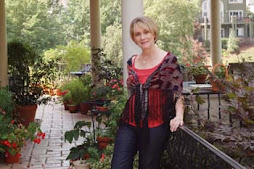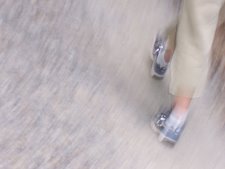
If you are new to Words to Go, we've enjoyed a week of chatting with Southern authors about “Lessons Learned Livin’ Down South.” You may scroll down and not only enjoy the author’s stories but also meet a community of like-minded readers leaving feedback. Readers’ feedback is entered each day in Patty’s Big Straw Hat for a Friday book give. Tonight’s Big-Haired Southern Book Give-Away includes a generous collection of novels and non-fiction donated by the visiting authors who have gathered on our front porch. HOWEVER, please remember that winners are posted Saturday and readers are responsible for contacting us to claim book prizes.
Today Lessons Learned While Livin’ Down South invites southern memoirist David W. Pierce onto the front porch. David has written two memoirs including his just released book Don’t Let Me Go and Salvage. Don’t Let Me Go is a story about the adventures that he and his daughter Chera took climbing mountains and running marathons. He has had nearly a dozen short stories published in Alfred Hitchcock’s Mystery Magazine and Ellery Queen’s Mystery Magazine. He has collaborated with his wife Christian comedienne Chonda on six adult non-fiction projects and two children’s books published by Zonderkidz: Tales from the Ark (2001) and Tales from the Manger (2004).
PATTY: David, I’m so glad we had this time to chat today. Welcome to Words to Go.
DAVID: Thanks, Patty!
PATTY: David, I grew up in Arkansas and I don’t think a lot of folks know how slow our state was in coming out of the chute. I still remember visiting relatives who still used outhouses. You grew up in Tennessee, a neighboring southern state. I believe you might understand what I’m talking about when I say that rudimentary living has its challenges but also it’s benefits.
DAVID: I do, Patty. I was born in Tennessee. Lived in and around Nashville all my life. When I was nine we moved out to the country (I know people not from the South think everywhere in Tennessee is in the country). It was a small house with no running water for the first few months—until Dad piped it in from the spring in the yard. It was a grand day when he set the toilet, especially so because winter was coming on.
PATTY: Simple pleasures in that setting is a big day to a kid.
DAVID: In the country kids play in the woods. I have a brother and sister close to the same age and the neighbors had five kids about our age. We played army. We searched the creek for crawdads. Shot down hornet’s nests with bow and arrows we made. Find snakes and kill them. Trap opossums and then let them go. Shoot BB guns. Throw rocks. Whack rocks over the barn with a baseball bat. Climb in the barn. Swing on grapevines. Build tree houses. Dam up the creek and swim around. Find returnable cold drink bottles and cash them in for candy money. Buy candy. Play Match Box cars in the dirt. There was always plenty for a kid to do in the country.
PATTY: This sounds very familiar. I know exactly how to catch a crawdad, right behind those pinchers. It’s a small world, but very entertaining to a kid whose universe is just that. Now my folks were the neighborhood backsliders. Yours, a little different from mine. Want to share about that?
DAVID: As far as I knew, as a kid, on Sunday everyone in the world went to church. We went to a big Baptist church in Nashville. Dad always wore a suit—it was the only time he ever wore a suit. He smoked a lot. Seems most Baptist men did. There was a place to the side of the church where a big knot of men—mostly dressed in black suits—would gather between Sunday school and worship service to smoke. The rest of us would grab a pew and Dad would catch up. There’s an evangelist known as the Preacher of Bourbon St. named Bob Harrington.
PATTY: Yes! I remember Bob Harrington. I a lot of the old revivalists and also the quartets came through our valley.
DAVID: He came to our church many times for revival. Dad loved revivals. (Maybe because he got to wear his suit every night—and he did.) And Dad loved Bob Harrington. This evangelist sold records—the old vinyl LPs that you played on 33 1/3 speed, and Dad bought all of them. Whenever anyone would come visit us at our house in the country, either family or friends, Dad would make them sit down and he’d play these records for them. He’d nod at the profound parts, laugh at the funny parts, and eventually fill up an ashtray with old butts.
PATTY: The world has changed a lot since then.
DAVID: I love stories that are set in the South. They seem so…green (and I thought this long before we were worried about ozone). But go out West and you’re going to miss the green of the South. The hills, rivers and lakes, curvy, winding roads, the humidity and trees everywhere. I was in Arizona one day and the cab driver asked where I was from. When I told him he said, “Yeah, I’ve been there once. Couldn’t really see anything for all the trees.”
PATTY: Oh, yes. Traveling to a Southerner means that we get to hear the same clichés fed back to us, like we haven’t heard them a million times. Some people don’t know we invented them. What sort of southern writings have informed your own writing, David?
DAVID: I love reading William Faulkner, Flannery O’Connor, Eudora Welty and Lee Smith. There is such a built-in irony to their stories: all set in country that is so green and so full of potential for play, for fun; yet there will be a seamy side exposed, a certain grotesqueness that reminds us at gut level of our human, broken condition.
PATTY: I love the Southern gothics too. I’ve written two and that’s still my favorite genre.
DAVID: Much like floating along on a pristine river and then hearing banjo music. (I know that’s what people not from the South are always thinking about us—the banjo music!)
PATTY: I think there’s a T-shirt sold in mountain outfitters’s shops that says “If you hear banjo music, turn back!” But it is the flavor of the South that gives our stories their distinctions.
DAVID: I’ve written several books now, some published some not. But you don’t have to read far into any of them before you find sweet tea, or dirt roads, barns, woods, cabins, decoration day (where the family would gather at the cemetery to decorate the graves of our loved ones with flowers and then find a nearby grassy patch for one huge picnic), muddy rivers, carp and catfish, creek banks, a little church, or a preacher’s daughter. In fact, I even married one of those—on the front porch of an antebellum home way out in the country, that belonged to Chonda’s cousins.
PATTY: That sounds very romantic. There are still antebellum homes down in Louisiana. But a lot of the South is fading. I never hear tell any more of decorations. My mother used to take us to “Decoration” and it was like a celebration of the lives gone on before us. I think it’s one of the reasons I don’t fear death. As a child, we were taught about death through sacred rites and traditions. It’s why I’m not afraid to turn over those types of rocks in my novels.
David, thank you so much for visiting on our front porch today at Words to Go.
DAVID: Thanks, Patty. I’ve enjoyed it.
PATTY:What a great week this has been, an entire week of chats with some of America’s top Southern authors representing so many genres. As you can tell, Southern writing is alive and flourishing. If you haven’t added southern books to your home library, there’s no time like the present. Tonight, after today’s feedback, I’ll hold the drawing for the Big-Haired Southern Book Give-Away. Please visit tomorrow, Saturday, for the winners’ list. Authors are personally mailing out their autographed books to winning fans, so be sure and email me back right away with your mailing address.
Big-haired Southern Girl hugs from your favorite Front Porch Novelist and Friend,
Miz Patty








